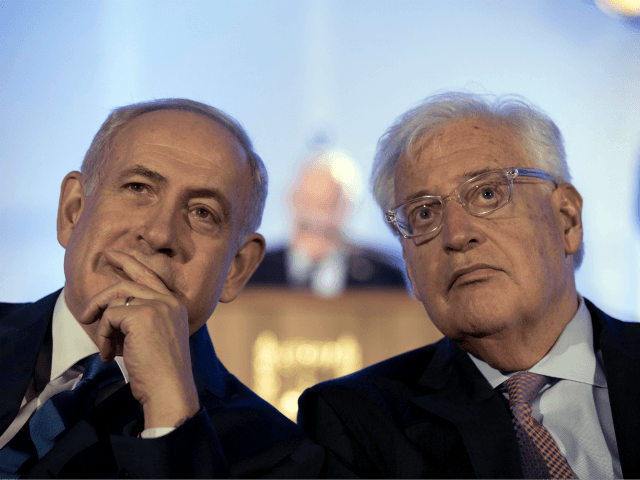TEL AVIV – U.S. Ambassador to Israel David Friedman on Monday slammed American media outlets for their failure to properly fact check their coverage of the violent riots on the Gaza border, saying journalists should “keep your mouths shut” rather than writing something just to “fit an agenda.”
While criticism of Israel is legitimate, reporters should have put more effort into checking if there were indeed alternatives to Israel’s response to the violent riots before writing blanket accusations, Friedman said at media conference in Jerusalem.
“It would seem to me that in a journalistic environment where nine out of ten articles that are written about the Gaza conflict are critical of Israel, you’d think that some journalists would take the time and go and meet with experts and try to understand what could have been done differently or better before they criticize. And I just haven’t seen it,” the American envoy said.
He added that after talking extensively to military experts in the U.S., Israel and other countries regarding the correct rules of engagement, he found that the criticism of Israel’s response was largely unfounded. He slammed reporters for not going to similar lengths and speaking to military experts.
Reporters should “just keep your mouths shut until you figure it out. Because otherwise, all you’re doing is creating impressions that have no basis in fact. They fit a narrative. They fit an opinion. They fit an agenda. But it’s not reporting, because it’s not based on hard, factual analysis,” Friedman said.
Friedman added that, according to experts, tear gas, water cannons and other nonlethal means of crowd dispersal would not have been effective during the riots, which has seen tens of thousands of Palestinians surrounding the border with Israel, many of whom are engaged in rock-throwing, tire burning and in the more extreme cases, breaching the border, planting explosives and throwing Molotov cocktails over the fence.
“If what happens isn’t right, what is right? What do you use instead of bullets?” he asked rhetorically.
“Some of [the criticism of Israel] even may be legitimate. I think the State of Israel itself hasn’t concluded its own internal inquiries into what happened. Maybe there are things they could have done better. I am sure there’s always things you could do better,” he said.
“Criticism is fair game. It’s what I would expect and what I appreciate,” he added.
He stated, however, that “with all the criticism Israel’s gotten, nobody has identified the less lethal means by which Israel could have defended itself during the last four weeks. Nobody.”
Friedman averred that Israel could not have done any differently given the situation.
“Who did this better in some other circumstances? Where is the other case where 40,000 people rush the border under the cover of burning tires, with Molotov cocktails, pistols, kites painted with swastikas, starting fires everywhere — fires that are still burning today?” Friedman said.
“Where did that happen in some other place, where the people rushing the border were committed to killing the citizens on the other side, and somebody did it better? Where is the manual that says, when this happens, you do this, this and this, and you can avoid the loss of human life or bodily injury?”
Without putting the riots into perspective by including those facts, he asserted, “all the reporting is completely superficial.”
While everybody is entitled to their own opinion, not everybody is entitled to their own facts, he said.
“And the facts do matter. If you get the facts wrong, there ought to be some recognition and some accountability,” he said.
“And as long as there isn’t, I think people will continue to feel comfortable with getting it first and getting it wrong. Because if you’re getting it first and you’re getting it wrong, and there’s no price to pay, you’ll do it over and over again.”
During his speech, Friedman, a former bankruptcy lawyer, also had some good words for the media, hailing the First Amendment of the US Constitution and saying a free press was vital to a functioning democracy, even if it attacks positions he holds dear.
“We don’t have a democracy without a free press. It’s simply impossible to do that,” he said.
Having to grapple with the competing requirements of accuracy and speed was not a valid excuse for sloppy journalism, Friedman said Monday, speaking at the launch of the new Jerusalem office of The Media Line, an American news organization covering the Middle East.

COMMENTS
Please let us know if you're having issues with commenting.